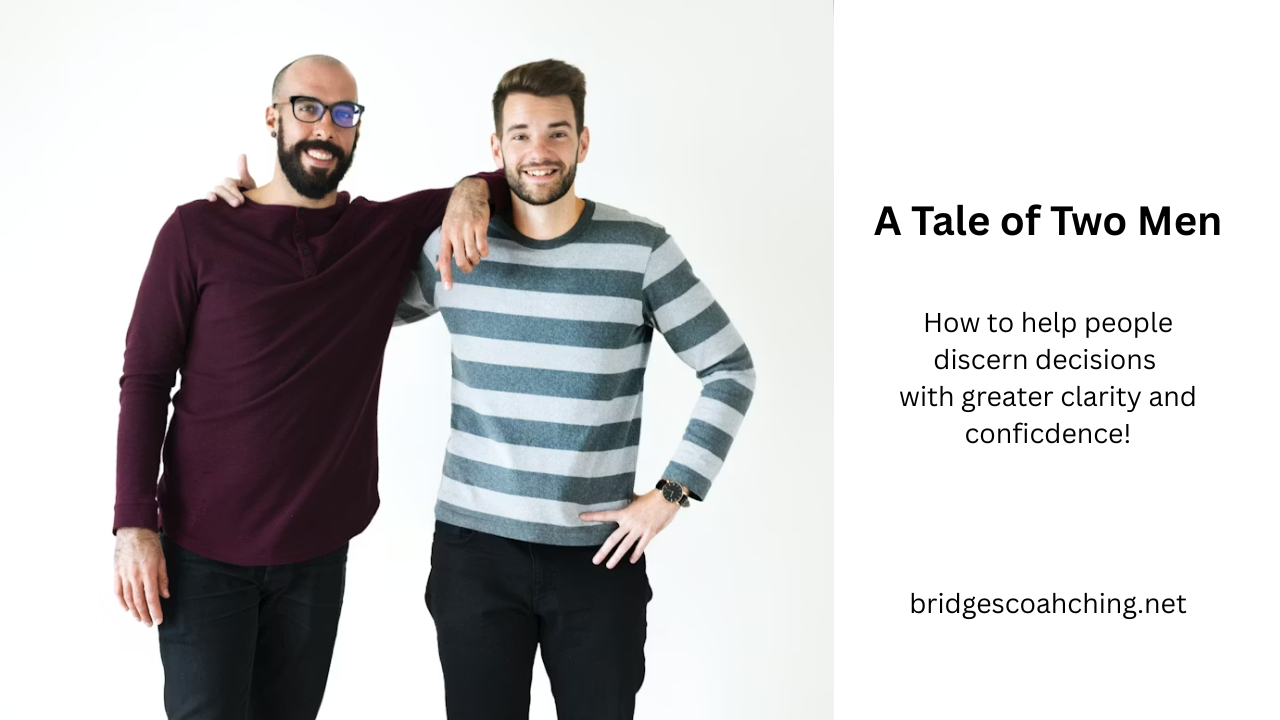"How Will You Know?" [Pendulum Perspective]

In this series, we'll explore the Pendulum Process, where we examine different aspects of life through a pendulum perspective. We will explore how to discuss both sides of a focus, define the edges, and help people discern what's next.
So there I was coaching a young go-getter who had ANOTHER great idea.
This guy was a genius. Full of passion. Devoted to God, his family, and furthering the kingdom! He's the real deal. I'm not sure exactly what God has for him, but I definitely feel honored to know him and to walk with him in this season of his life.
So, what's the problem? Glad you asked.
This wasn't Joe*'s first great idea. He is one of those people who is loaded with great ideas. You know the kind. It can seem they have a different plan every time you talk to them. And all of them are viable. Some of them actually move on, but often they bite off more than they can chew.
I didn't serve Joe well the day he proposed this particular idea. Instead, I listened and partnered with h...
Three Types of Crises We All Face

As I think about it, I see 3 types of crises in people's lives, and I think we are all in one or more at any given time. Let’s explore.
1) Imposed Crises
This is when "stuff" happens TO us. We live in a world where so many things are not as God intended. A diagnosis changes everything, or a misunderstanding. Accidents fall into this category, and expectations. Somehow, we need to press through. Coaching can help people discern God's plan for comfort, guidance, courage, and patience when a crisis like this comes our way. Coaching helps us connect what God has for our real lives. It helps us create new pathways to experience Him in our lives.
2) Chosen Pursuits
A chosen pursuit is simply that - something we chose rather than having it imposed on us. We choose things like a leadership opportunity that stretches us, a project that requires investment, resolving a relational dilemma, or any other goal we decide to pursue.
Coaching helps us keep it up, adjusting the pace and plan as n...
Two Simple Questions That Could Shape Your Future

As you reflect on the past year and consider the one upcoming, here are two simple questions that could shape your future.
User warning: Keep in mind that God may be speaking to you through your own desires, but also that, as humans, we are all susceptible to wanting things to be comfortable and resolved.
Question #1: What do you want less of in your life?
Right away, a list of things comes to my mind. I'll share a few ideas, but as you answer, try to narrow it down to just a few. (Remember the post about bullet point journaling- I some ideas from there.)
In no particular order, here are some things to want less of: hurry, hurt, obligation, overwhelm, confusion, frustration, anger, self-pity, worry, disconnection, fear, angst, lack, sadness, shame, tiredness, or feeling behind. If you found yourself wondering why I chose a certain word and not another, maybe the word you thought of is a good one for your list.
Okay - reread the list and see if you can narrow it down to three.
Q...
Looking for Unique Wish List & Gift Ideas?

Make this year's exchange memorable!
Here are some meaningful, unique ideas for you to put on your Wish List or to fulfill your Gift List!
Traction Book
This inspiring self-guided workbook can be used by an individual, couple, or team to get "traction" and move forward. (less than $30) Give a gift that makes a difference - or request this book as a way to make this next year purposeful like never before!
Soul Care Retreat
This video course could be the lifeline someone needs. Or maybe your soul could use a little attention?The video, journal prompts, and practical steps bring refreshing to the soul and reconnection to the Spirit. ($67 - BE SURE TO enter the email of the person you are purchasing for so they have access directly!)
For more ideas, check out our
Bridges Coaching product page!
Merry Merry!
3 Vital Questions to Stay On Course [Inspired by Eric Scott's message]

My husband recently shared 3 intriguing questions he highlighted in a message for a staff meeting. They sparked an insightful conversation for us and brought some clarity for where I am at personally.
He was speaking from a passage in 2 Timothy 4:6-8,
6 My life is being given as an offering to God, and the time has come for me to leave this life. 7 I have fought the good fight, I have finished the race, I have kept the faith. 8 Now, a crown is being held for me—a crown for being right with God. The Lord, the judge who judges rightly, will give the crown to me on that day—not only to me but to all those who have waited with love for him to come again.
Here are the questions Eric posed.
1. Am I in the right race?
A race implies a certain end goal. The question implores us to consider where we are headed. If we can't answer that question, it may even cause us to invest some time in an evaluation of the chapter of life we are in. (Our Destiny by Design course could help with th...
The Surprising Truth About YOUR Personal Kyptonite? [Processing Series]

Even if you are not a Superman fan, you probably know what "kryptonite" is. It's kind of his Achilles heel, he is super strong and all the things, except for when he is exposed to kryptonite.
Each of us has a kyptonite of sorts, something that steals life from us and keeps us from being as "super" as we could be. The surprising truth is that most often the thief of your being at your best is when a strength you have gets pushed too far.
Let me explain.
One of my best strengths is that I am a methodical strategist. I love planning ahead and am more comfortable living in the future rather than the present. This comes in handy as a coach. It is a value add for people I am working with when I help them build step-by-step plans and they build bridges to what could become real in their lives.
The kryptonite part comes in for me personally when I live more in the future than the present.
I'm building several bridges in this season in my life. I'm writing a book, I'm coaching a great ...
How to Halt the Madness of Over-Thinking: Processing Series

Swirling thoughts can be jsut as disruptive as negative emotions. Over-thinking has become a national passtime. We can wonder about ourselves and if we are doing the right thing(s). We can become consumed with what others are thinking about us. We can even obsess about the past and get caught up in "what if" syndrome.
Living in a state of over-concern is taxing not only on our mind, but also takes its toll on our body and on our relationships. Over-thinking robs us of living in the now because we are trying on scenarios for the future and the past instead of enjoying the moments.
Procssing over-thinking can take some mental training, but it is quite possibly one the best investments you can make with your time and energy. The ROI is worth the effort!
Whether you are the one with the over-thinking issue or you are coming alongiside someone in a coaching relationship, here are some steps you can take to help you in the process of taking back control of your thoughts when they get dem...
3 Steps to Navigating Negative Emotions: Processing Series

Life has storms - external and internal. Negative emotions are never fun, but they are important. They are like a gauge on your life dashboard alerting you to pay attention to something. Good coaching can assist with learning how to manage and mine them.
Here are some options that may help you or someone you are working with.
- Name the feeling. This is so valuable! Some times there is a general sense of malaise and starting with naming it can help you with addressing it well. Chip Dodd's book "The Voice of the heart" and his free emotional resource materials can help, but simply taking the time to identify what your gauge is saying is helpful. Are you sad, angry, lonely, fearful, hurt or something else? (This is the R- recognize part of the Coaching ROAD)
- Consider your options. It could be anything from counseling to a distracation to a release. Talking to someone usually helps reveal the next step, when you hear yourself or someone say something like, "What is need is a good cry" ...
Two SIMPLE Phrases That Flip The Conversation To A Coaching Mindset

There is a skill set to coaching, to be sure, but more than a skill set, coaching is a mindset.
More than following a formula, coaching* has to do with a heart posture that believes God's Spirit endwells people and is guiding each of us on our own unique journey. A good coach is a thinking partner who offers a safe space to process your pathway out loud. They are cheerleaders and sometimes mirror holders. They believe in your ability to work through whatever life has thrown at you, to do new things, to work through obstacles, and to follow through when the going gets tough.
Two super simple phrases that can be a game-changer in a coaching session or a conversation.
1) Tell me more.
Tell me more - offers the person replying to go anywhere they want to go in what they share next. In fact, they may not even know until they keep talking what they need to "get out" there to discuss.
Proverbs 20:5 says, "People’s thoughts can be like a deep well, but someone with understanding can f...
Okay - Third Essential for a Growth Mindset

We've been looking at the 2, maybe 3, essentials for a Growth Mindset.
Without #1 - humility - we will have a hard time being willing to acknowledge there is something we need to focus on.
Without #2 - intentionality - we acknowledge the problem or the goal, but we haven't actually moved the needle. It's like when we say, "You know what I need to __________________ (lose some weight or insert other Aha moment here)" or "I guess I do have a problem with __________________ (anger, insecurity, addiction, or whatever)" or "If I don't start, I'll never ______________ write that book build that thing, find a spouse, get that degree."
You can't address something you can't name.
But perhaps, before it all, or maybe during it all, the greatest essential for a growth mindset is HOPE!
Without #3 - Hope - it's like trying to drive a car with no fuel. Hope fuels our preferred future. Hope helps us see what could be. Hope changes everything.
Without hope, humility is just a sad recognition o...
